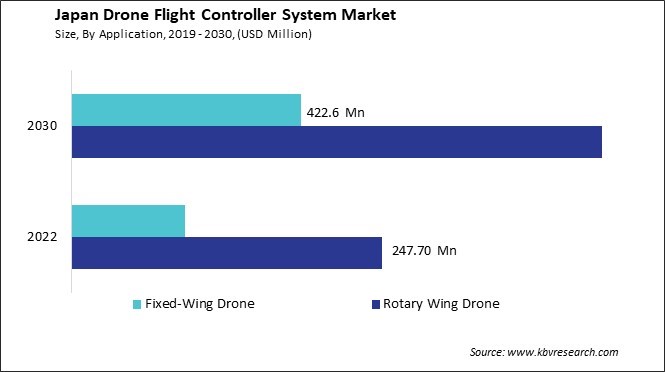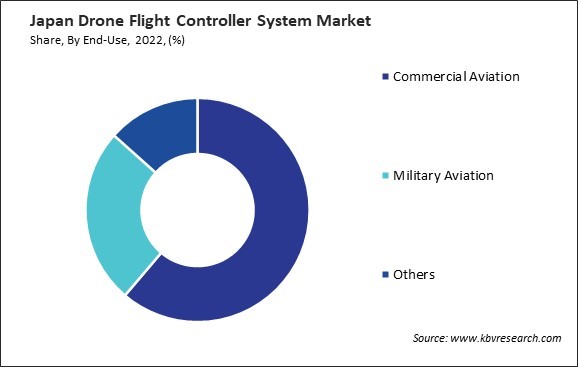Int'l : +1(646) 600-5072 | query@kbvresearch.com
Int'l : +1(646) 600-5072 | query@kbvresearch.com
Published Date : 17-May-2024 |
Pages: 88 |
Formats: PDF |
The Japan Drone Flight Controller System Market size is expected to reach $605.1 Million by 2030, rising at a market growth of 7.7% CAGR during the forecast period.
Japan's drone flight controller system market has witnessed significant growth in recent years, driven by the increasing adoption of drone technology across various sectors. Japan's drone industry has expanded beyond recreational use, with applications in agriculture, surveying, infrastructure inspection, and disaster response. One of the driving factors for the growth of Japan's drone flight controller system market is the rising demand for efficient and reliable UAVs in agriculture.

Japanese farmers increasingly adopt drones with advanced flight controllers to monitor crop health, optimize irrigation, and enhance agricultural productivity. Infrastructure inspection is another area where drone technology has gained traction in Japan. Using drones equipped with advanced flight controllers allows for efficient and accurate inspection of bridges, power lines, and other critical infrastructure, reducing the need for manual inspection and enhancing safety protocols.
However, the COVID-19 pandemic has had a notable impact on Japan's drone flight controller system market. The restrictions on movement and economic uncertainties have led to a temporary slowdown in the adoption of drone technology across various industries. Despite these challenges, the resilience of the Japanese drone industry and the continued need for innovative solutions in various sectors suggest a potential rebound as the global situation stabilizes. The post-pandemic era is expected to bring renewed focus on the benefits of drone technology, driving the demand for advanced flight controller systems in Japan.
In Japan, the utilization of drones in the mining and construction sectors has witnessed a remarkable surge, revolutionizing traditional practices and enhancing operational efficiency. The drone flight controller system market has become a pivotal aspect of this transformation, crucial in facilitating precise and controlled drone operations. In mining, drones equipped with advanced flight controller systems have proven instrumental in surveying vast terrains with unparalleled accuracy. These devices provide real-time mapping and 3D modeling capabilities, allowing mining companies in Japan to optimize resource exploration and extraction processes. The drone flight controllers enable seamless navigation through challenging topographies, ensuring that mining operations in Japan are conducted with precision and minimal environmental impact.
Similarly, within the construction industry, Japanese firms have embraced drone technology powered by sophisticated flight controllers to streamline various tasks. Drones with high-resolution cameras and LiDAR sensors enable construction professionals to monitor project sites, assess structural integrity, and track progress efficiently. With a robust manufacturing sector, Japan has the potential to be a key player in the development and production of advanced technological components, including those related to drone technology. The country's precision engineering and innovation expertise positions it favorably for drone flight controller system advancements.
According to the U.S. Geological Survey, in 2019, Japan's nominal gross domestic product (GDP) reached $5.13 trillion, with the manufacturing sector contributing 20.5%, the construction sector 5.4%, and the mining and quarrying sector 0.1% of the overall GDP. In particular, Japan's drone flight controller system market has experienced notable growth, aligning with the nation's commitment to advancing automation and robotics.
Japan's emphasis on technological innovation is reflected in the growing demand for drone flight controller systems designed to meet specific industry requirements. Companies specializing in these systems have tailored their offerings to address the unique challenges faced by the mining and construction sectors in the Japanese context. Hence, Japan's mining and construction sectors have experienced a transformative shift with the widespread adoption of drones equipped with advanced flight controller systems, enhancing operational precision and efficiency.
In recent years, Japan has witnessed a significant surge in the popularity of rotary-wing drones, marking a notable trend in the country's drone flight controller system market. One key driver of the rising popularity of rotary-wing drones in Japan is their versatility and adaptability to various applications. In a country prone to natural disasters like earthquakes and typhoons, the agility and flexibility of rotary-wing drones have become crucial for timely and effective response efforts.
Furthermore, the growing interest in recreational drone usage has contributed to the surge in demand for rotary-wing drones. Enthusiasts and hobbyists are increasingly drawn to the unique capabilities of these drones, appreciating their ability to capture stunning aerial footage and navigate challenging terrains. The appeal of capturing Japan's picturesque landscapes from a bird's-eye view has led to a burgeoning industry for consumer-grade rotary-wing drones equipped with cutting-edge flight control systems.
Japan's commitment to innovation and technology adoption has also played a pivotal role in the ascendancy of rotary-wing drones. Integrating advanced flight controller systems featuring sophisticated sensors and artificial intelligence capabilities aligns with Japan's reputation for technological excellence. As a result, industries ranging from agriculture to infrastructure inspection have embraced these advanced drone technologies to enhance efficiency and precision in their operations. Therefore, the popularity of rotary-wing drones in Japan is driven by their adaptability in disaster response and the nation's commitment to technological innovation, leading to widespread adoption across various industries for enhanced operational efficiency.

Japan's drone flight controller system market has witnessed significant growth in recent years, driven by the increasing adoption of drones across various industries. Several companies in Japan have emerged as key players in this dynamic industry, offering innovative solutions tailored to the unique needs of the Japanese industry. One notable player in the Japanese drone flight controller system market is ProDrone, a Tokyo-based company specializing in developing and manufacturing industrial-use drones and drone-related equipment. The company's flight controllers are designed for precision and stability, catering to applications in agriculture, infrastructure inspection, and surveying.
Yamaha Motor, a renowned name in the automotive industry, has also made substantial strides in the drone sector, particularly with its Yamaha Motor RMAX series. While Yamaha Motor is traditionally associated with motorcycles and marine products, its foray into the drone industry is notable. The RMAX series utilizes advanced flight control systems for agricultural purposes, such as crop spraying, showcasing Yamaha's diversification into the precision agriculture segment in Japan.
Another influential player is Terra Drone, a global drone technology company with a strong presence in Japan. Terra Drone provides end-to-end solutions, including specialized flight controllers, for the construction, mining, and oil and gas industries. The company's emphasis on leveraging drone technology for improved efficiency and safety has resonated well with the Japanese industry, where industrial applications drive drone adoption.
Japan Aviation Electronics Industry, Ltd. (JAE) is a key player in providing connectors and electronics solutions for various industries, including the drone sector. While not exclusively focused on flight controllers, JAE plays a crucial role in supplying essential components that contribute to drone systems' overall functionality and reliability. The company's expertise in electronic connectors supports the seamless integration of flight control systems into drones.
Micronix, based in Osaka, specializes in developing compact and lightweight drone flight controllers. The company's solutions are tailored for consumer and professional drone applications, emphasizing portability and ease of use. Micronix has gained traction in the Japanese industry by addressing the growing demand for user-friendly drone technologies among hobbyists, photographers, and small businesses. As the drone industry continues to evolve, these companies are at the forefront, driving innovation and contributing to the widespread adoption of drone technology across various sectors in Japan.
By Application
By End-Use
By Sales Channel
By Range of Operation